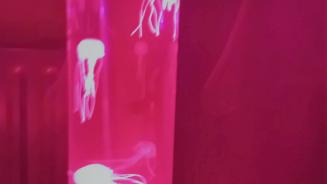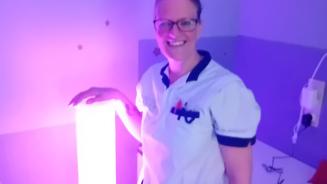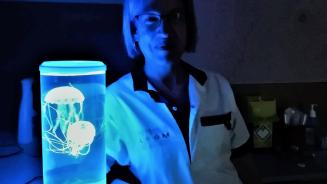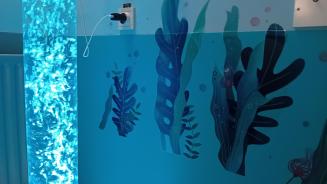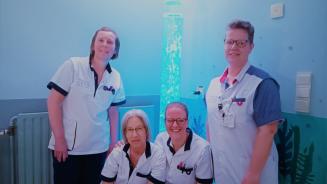Snoezelen: Enhancing patient Well-being in the blood collection service
Our team of nurses in the blood collection service at the Children's Hospital (Huderf) invites you to journey through aquatic and space-themed worlds to reduce children's anxiety before a blood draw
What is Snoezelen?
The term "Snoezelen" combines two Dutch verbs: "snuffelen" (to explore, sniff) and "doezelen" (to doze, relax). This method creates a calming and stimulating sensory environment, blending active exploration with deep relaxation. Initially developed for individuals with intellectual disabilities, this approach is now applied in various contexts, including hospitals, to improve the well-being of young patients.
Four Thematic Universes for a Positive Experience
The Snoezelen rooms at HUDERF are equipped with various sensory devices, such as bubble columns and light shows, specifically designed to soothe and entertain young patients. Nurses can choose from four distinct themes based on the children's preferences: the sea, space, the world of jellyfish, and the rainbow. This personalization makes each visit unique and engaging, helping to capture children's attention and create a positive and relaxing experience.
The Snoezelen rooms at HUDERF are equipped with various sensory devices, such as bubble columns and light shows, specifically designed to soothe and entertain young patients.
The Benefits of Snoezelen
- Promote Physical and Mental Relaxation: Provide a space where children can relax and feel safe.
- Enhance Sensory and Motor Experiences: Encourage children to explore new sensations through light shows, soothing sounds, and varied textures.
- Reduce Anxiety and Behavioral Issues: Create a calm and secure environment to alleviate the anxieties of young patients.
- Facilitate Interaction: Help children interact safely with their environment.
- Awaken New Sensations: Stimulate curiosity and the desire for connection with others.
Short and Long-Term Benefits
By combining a reassuring and calming atmosphere, the Snoezelen approach at the Queen Fabiola University Children's Hospital helps prevent the development of medical phobias in young patients while minimizing the risk of negative memories associated with medical care. This method creates a positive and peaceful experience during medical procedures, reducing fear and anxiety and building a trustful relationship between children and healthcare professionals. Consequently, children become more cooperative and more readily accept necessary care, improving their overall well-being.
